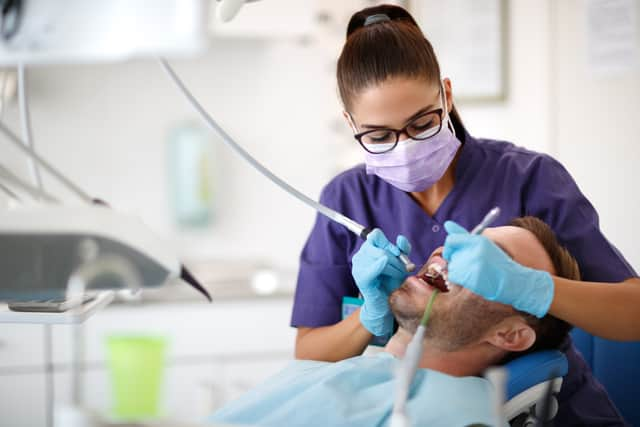NHS dentists: areas of England and Wales with the highest proportion of private dentists revealed in new data
and live on Freeview channel 276
Some constituencies in England and Wales have more private dental clinics than NHS clinics, meaning that patients could face longer wait times, or more expensive care costs if they choose to go private.
Data sourced from NHS Digital shows a significant disparity in access to NHS dental care across the country. The data shows the number of 'NHS and private' (where treatment is provided on the NHS as well as privately), and private-only (where no NHS dental care is carried out) dental practices in each constituency in England and Wales.
Advertisement
Hide AdAdvertisement
Hide AdNHS dental care provides treatments that are deemed clinically necessary for a patient’s health, but cosmetic treatments are not generally carried out by the NHS. Whilst NHS dental treatments are not usually free, they are provided at a considerably reduced cost compared to private treatment.
The British Dental Association (BDA) have stated that an 'exodus from the NHS' is in motion - this has exacerbated the problem of access to affordable dental care for many people across England and Wales.


For example, wisdom tooth removal would cost around £70 on the NHS and is free if hospital treatment is required, whereas privately it could cost in the region of £200 to £350, and in some cases even more. Therefore, reasonable access to NHS care is important for the health of those across the country, but recently released data shows there are significant disparities over access to NHS dentists.
Across England and Wales, one in six dental surgeries (15%) do not do any NHS work, but this proportion varies hugely by local area, according to the NHS Digital data released through the House of Commons Library.
Advertisement
Hide AdAdvertisement
Hide AdConstituencies with the highest proportion of private dentists are: London and Westminster (67%), Christchurch (65%), Bournemouth East (62%), and Chelsea and Fulham (52%), all of which are in the south of England.
At the other end of the scale, there are 128 constituencies (22%) with no private-only practices at all, the most populous of these constituencies are Barking and Tottenham in London, both with over 140,000 people.
Regional disparities show that constituencies with the highest proportion of private dentists tend to be in the south of England, particularly the South West, whilst Wales has the lowest proportion. The north east of the country also has a low percentage of private dentists.
There are four constituencies in which more than half the number of dental clinics are private-only (all of which are in the south of England) and 40 where one third or more only carry out private work. Of these top 40 constituencies, just eight are in the north of the country, one is in the Midlands, and none are in Wales.
Advertisement
Hide AdAdvertisement
Hide AdWhilst there are wealth disparities between those living in the north and south of the country, people living in poverty exist across all constituencies, and lower levels of access to NHS dental care will disproportionately impact the poorest in society.
BDA chair Eddie Crouch said: “The fact is government have no idea how many NHS dentists we actually have. Officials count heads not commitment. These numbers give an NHS full timer the same weight as a dentist doing one NHS check-up a year.
“There’s no sense then where the dental deserts actually are. What we do know is an exodus from the NHS is in motion, as colleagues walk away from a broken system. Government need to step up if NHS dentistry is going to have a future.”
Click on your local area or search in the box below to find out more information.
Advertisement
Hide AdAdvertisement
Hide AdThe BDA also said that their own Freedom of Information requests saw a drop in dentists performing NHS work of 695 in 2022/23, compared with the previous year. The union called for a real commitment to form a rescue package for dentistry in England and Wales ahead of longer-term negotiations over total reform.
A spokesperson for the Department of Health and Social Care said: “We are working to improve access to NHS dental care and have already increased the funding practices receive for high needs patients to encourage dentists to provide more NHS treatments.
"We have amended the guidelines so dental therapists and hygienists can deliver more treatments - as well as making it easier to recruit dentists from overseas - and we will be setting out further measures to improve access shortly.”
Comment Guidelines
National World encourages reader discussion on our stories. User feedback, insights and back-and-forth exchanges add a rich layer of context to reporting. Please review our Community Guidelines before commenting.
